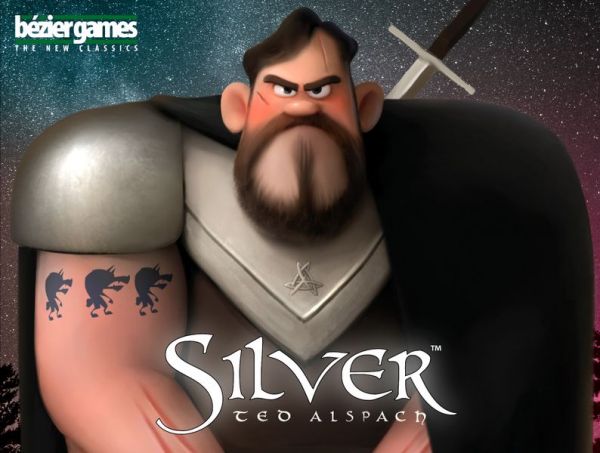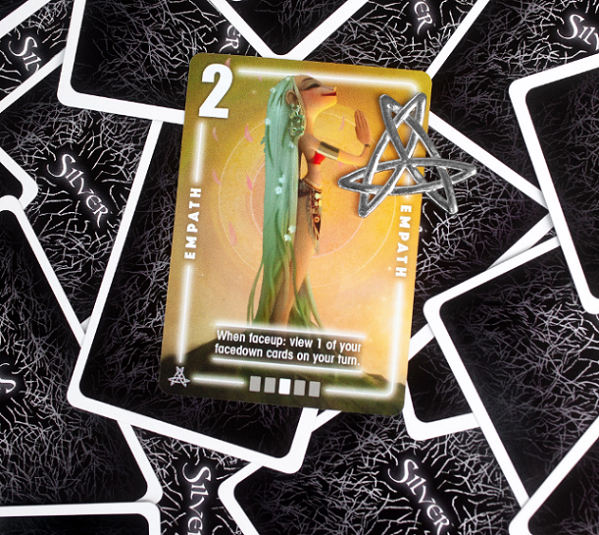Clear Your Village of Those Pesky Werewolves in Silver

Each player is mayor of their own village, which has unfortunately become infested with werewolves. Try to rid your town of them, or at least have fewer than your opponents, in order to win the game.
Silver, a new card game from Bézier Games, blends memory elements, unique role abilities, deduction, and a little bit of luck.
Gameplay
At the start of each round, you shuffle the deck and deal five cards face-down to each player. The remaining cards are placed in the center of the table, and one card is drawn to start the discard pile. You do not look at your cards, but instead lay them out in a row in front of you. This row represents your village. Each player may then peek at any two of their cards and the game begins.
Each card has a role (such as witch, rascal, or seer) and each role has its own unique number, which represents how many werewolves that card brings to your village, and an ability. Some abilities are triggered when you draw them from the deck and discard, some when the card is discarded from your village, and others while the card is face up in your village.
On your turn you do one of three actions. You may choose to take a card from the deck, in which case you draw it, look at it, and either discard it or exchange it for one or more cards in front of you. When you exchange it for cards in your village, you select a number of cards you think all have the same role and then reveal any that are face-down. If you were correct, you discard them all, and place the new card in the location in your village of one of these cards. If you were incorrect, you do not discard any cards and add the new card to your village. The card you drew is added face-down either way. Alternatively, you may take the top card of the discard pile and exchange it for one or more cards in your village, the same as when you draw from the deck, only the new card is added face up.
The final action you can take on your turn is to call for a vote. You may only take this action if you have four or fewer cards in your village. Each other player then gets one more turn, and all cards are revealed. Players then determine the number of werewolves in their village by adding up the numbers of all of their cards. If you called for the vote and you had the lowest score, you score zero penalty points. Everyone else scores penalty points equal to the total of their cards. If you called for the vote and do not have the lowest score, you earn an additional penalty of ten points above and beyond your card total.
There is also a silver amulet token. It goes to the player who scores the fewest points each round to signify first player for the next round. However, if that player was also the one who called for a vote, they also get to use the amulet’s ability. As part of your turn, you may place an amulet on one of your cards, and that card may not be moved or viewed (by your opponents or yourself) during the rest of the round.
The player with the fewest points at the end of four rounds wins the game.

Review
Silver is a great card game, with intriguing deduction elements, a dash of push-your-luck, and solid player interaction. It reminded me a little of one of my favorite childhood card games, Rat-a-Tat Cat, but packaged in a game that felt much more modern and with more depth.
There are certain elements of a memory game in Silver as remembering what’s been played, and what you’ve seen your opponents do, is important to choosing your own actions, how you use card abilities, and when to decide to call the vote. The lure of the silver amulet’s ability and the promise of zero points makes calling the vote an intriguing proposition, and gives you incentive to try it despite the risk. Deciding when to call the vote really adds to the suspense of the game.
Aesthetically, Silver is lovely, with beautiful artwork for the card backs and each of the role types. The silver amulet is also an attractive game piece, and the cards good quality. It’s also just a neat idea to set a game in the universe of a game of Werewolf. It’s fun to see where Silver gives small nods to that well-played world, while still being its own unique game.
There are helpful player aid cards to assist with the flow of the game, but while the rules are relatively simple, learning each role’s ability does take a little while and make it a little harder to learn, especially since the text on each card isn’t enough to figure out exactly how each power plays out. There is a booklet you can pass around that goes into details, and once everyone is familiar with the game this stops being a problem, but it is worth mentioning that this will slow down gameplay and increase downtime the first few times you play. Still, we enjoyed the wide range of abilities, and how each role contributes to gameplay.
Silver plays well across its player count: it’s light, smooth, and fun. It’s attractive to look at, and blends its various mechanics together nicely.
Pros: Attractive components, player aid cards, the call vote mechanics, memory elements
Cons: Learning all the abilities will initially slow down play
Disclosure: we received a complimentary review copy of this game.







